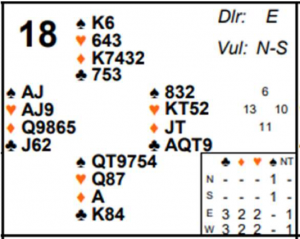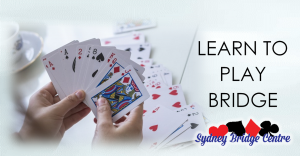City and Canada Bay – Monday Morning 15th July 2024.

Board 18 last week saw most pairs playing in 2♠ but it had some interesting points about overcalling and defending.
Looking at the auction East will pass and South will open 1♠. The first real decision is West’s. Holding 13 points you may well want to take some action. I’m sure some will have overcalled 2♦ but if I am going to act at all I would prefer a takeout double.
A 2♦ overcall is fraught with danger for lots of reasons:
- It is only a 5 card suit
- The suit quality is poor
- The hand is balanced
- There are defensive values in the opponent’s suit
- Partner is a passed hand so there’s no comfort that he has any values or any diamonds.
Today it works out OK but that’s because partner is close to an opening bid and has ♦J10. Imagine if those 2 diamonds were with North and, worse, perhaps one of the club cards too. Now there’s a good chance you could be going for a penalty of at least 500 when the opponents can’t make anything or 800/1100 when they make game.
In general these days players are overcalling lighter and it’s quite common for a 1 level overcall to not have that much at all (especially if it pinpoints a good lead for partner or takes up space like 1♠ over 1♣). 1 level overcalls in those situations have more to gain than they have to lose (even if the opponents have lots of values it’s often very hard in practice for them to take a sufficiently large penalty at the 1 level – they are more likely to just bid their game). Things are very different at the 2 level though – here good opponents will frequently penalise you. So 2 level overcalls should only be done on decent hands that will score tricks (ideally a reasonable 6 card suit).
So if we don’t like overcalling 2♦ on this hand what do we do? There are only really two choices – pass or double. Double isn’t ideal either of course because it has values in spades and only 3 hearts when partner will usually expect 4. But it at least offers 3 places for partner to play and when he has a 5 card suit that may work out OK.
What will North do over 2♦? All he can do is pass – he doesn’t have direct spade support or enough values to do anything else. East can’t really move over 2♦ and it’s then a question of whether South decides to reopen with 2♠. That’s also quite dangerous being vulnerable with a broken suit and partner silent.
Over double, however, it’s quite common to just ignore the double and for North to just make the bid he’d have done without the intervention – 1NT. East will probably now venture 2♥ (assuming partner has 4 for his takeout double). Now South is more likely to bid 2♠ as partner has volunteered a 1NT bid when he didn’t have to. That will go back to East who might even try 3♣ now which could work well on this hand.
It’s also possible West will just pass over 1♠ (that may pay dividends when defending later because it’s given declarer less information away about his hand). Now the auction will be uncontested with South rebidding 2♠ (but see advanced section for an alternative rebid structure).
Most pairs played in 2♠ though so let’s consider the play and defence to that. West most likely leads a diamond which South will win and no doubt lead a spade towards dummy. West will be disappointed to see the ♠K over him so he could take ♠A or duck (it’s slightly better to duck – see advanced section for why). If West does win ♠A, he should know that the ♦K is about to provide a discard (he can see 10 diamonds and if East had ♦10 only then South would have had ♦AJ and would have won trick 1 with ♦J). But it’s by no means clear for him to lead a heart (South could easily have the ♥K which will give away a trick). So he’s probably better off exiting a trump and at least forcing declarer to take his discard on the ♦K straight away.
Declarer can discard a loser on ♦K (a club most likely – but it doesn’t really matter). Then, since it’s the last time he will be in dummy, he can try leading a club to the ♣K and will be pleased that the ♣A is on his right. Overall that will lead to 8 tricks – 5 spades, 2 diamonds and the ♣C. Deep Finesse can beat 2♠, however.
Can you see how? See advanced section.
Key points to note
- Overcalling at the 1 level these days is frequently pretty aggressive and doesn’t show that much.
- Overcalling at the 2 level is very different. Doing so with a 5 card suit and a balanced hand is very dangerous. Good opponents will take a penalty from you whenever the cards sit badly. Competing with a takeout double is more flexible. Simply passing can often work out best. Try to keep 2 level overcalls to reasonable 6 card suits.
- After partner opens the bidding it’s a good idea to just ignore an intervening double and bid what you would have done anyway.
- Blocked suits (i.e. with holdings like singleton A or singleton K) are very annoying. Be wary of them – especially for no-trump play where they make establishing your tricks very hard!
After the auction begins 1 major P (or double) 1NT it’s not always easy to rebid. There’s a wide range of hands both opener and responder can have (remember 1NT isn’t necessarily a balanced hand it’s just a hand without primary support for the major, with some values but not enough to bid at the 2 level). A rebid structure I really like is to play transfers. Over 1♠ P 1NT 2♣ shows diamonds, 2♦ shows hearts and 2♥ shows an extra spade. A rebid of 2♠ actually shows clubs but is not forcing. Similar over 1♥P 1NT. This allows for a lot of hand types to be shown and for a jump to 3 of a suit to be game forcing (invitational hands start with a transfer and then make another bid like 2NT or raise the 2nd suit, etc). Partner basically starts off responding the same way they would had opener made his natural rebid (so he completes the transfer if he would have passed that bid, gives preference to 2♠, bids another long suit, etc).
I said West may be better to play ♠J and not immediately take ♠A. Why? Because it gives partner a chance to signal. Declarer will no doubt take a discard on ♦K and then play a 2nd trump putting West in. But now an alert East should have offered some help by the order he played his trump pips in. High low should indicate suit preference for the higher side suit (hearts). Low high for clubs. On this particular hand it doesn’t really matter because East is happy to signal either suit but on some hands it may be critical for him to help West.
Lastly how do the defence beat 2♠? Two ways.
· One is to start with clubs and knock out declarer’s ♣K. Now if declarer cashes ♦A and leads a trump this time West should jump in with ♠A. Now the defence can cash another club and then 3 hearts as well.
· The other (much risker in practice although it works on this particular hand) is to start with trumps and knock the ♠K entry out of dummy immediately.
In both cases the blockage in diamonds causes the problem for declarer. In the first case the defence get their 2 club tricks set up before declarer can unblock the diamonds to get a discard (although they have to hop straight in with ♠A to cash them). In the second case the only entry to dummy is knocked out before the diamonds can be unblocked.
Any time you have a singleton A or singleton K you should be wary because it’s likely to cause a blockage in the suit which, unless you have plenty of entries to each hand, can mean you can’t reach, or can’t establish, your tricks. This makes holdings like that especially bad for no-trump play. Either as declarer or as a defender you should be looking to try and unblock these holdings as soon as you can. On the hand here, if he gets the chance, one of declarer’s first actions should be to cash the ♦A to get it out of the way and free up the ♦K in dummy to be able to provide a discard for a loser.
Double dummy West could lead a low heart initially as well and then switch but that looks highly risky. A club lead is less likely to give a trick away.
Julian Foster (many times NSW representative)



